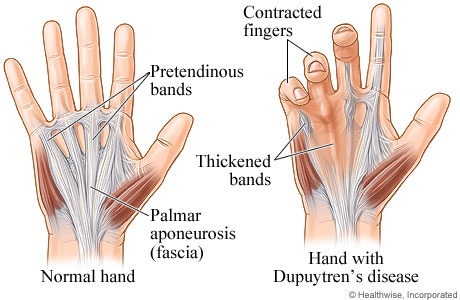Finger Contracture (Dupuytren's contracture)

In Dupuytren’s (say "duh-pwee-TRAHNZ") contracture, the fingers become stiff and curl toward the palm. It is caused by thick tissue that grows under the skin in the palm of the hand. Sometimes the condition affects the palm but not the fingers. If the tissue gets thicker and affects one or more fingers, it may limit movement of your fingers and hand. Sometimes the condition can occur in the soles of the feet.
The cause of Dupuytren’s disease is not known. Dupuytren’s disease may get worse slowly. If you have mild Dupuytren’s disease, you may be able to keep your fingers moving with regular stretching. Surgery usually helps in severe cases. However, Dupuytren’s disease can come back.
Symptoms
Dupuytren's Disease

Dupuytren's disease most often affects the bands or fascia of the hand (shown in the picture on the left). As the disease progresses, these areas can thicken and form a ropey cord. Eventually, the disease can limit movement or cause your fingers to bend so you can't straighten them. This is called a contracture (shown in the picture on the right).
What are the symptoms of Dupuytren's disease?
Dupuytren's disease has three general phases:
- In the early phase, you may see or feel a small lump in the palm of your hand, usually near where your ring finger and small finger meet.
- In the active phase, you may have dimpling on the skin of your palm. Long, ropey cords or bands form in the fascia. You may be able to see or feel them.
- In the advanced phase, a fibrous cord may form in the fascia that pulls your fingers toward your palm. This is called Dupuytren's contracture. Over time, you won't be able to straighten your fingers or flatten your hand on a table. It may be hard or impossible to do things like put on gloves, wash your hands, or pick up things.
In most cases, Dupuytren's doesn't cause pain. You may not even notice it until you develop a contracture.
The disease usually gets worse slowly. In many people, it never causes major problems.
Diagnosis
What are the symptoms of Dupuytren's disease?
Dupuytren's disease has three general phases:
- In the early phase, you may see or feel a small lump in the palm of your hand, usually near where your ring finger and small finger meet.
- In the active phase, you may have dimpling on the skin of your palm. Long, ropey cords or bands form in the fascia. You may be able to see or feel them.
- In the advanced phase, a fibrous cord may form in the fascia that pulls your fingers toward your palm. This is called Dupuytren's contracture. Over time, you won't be able to straighten your fingers or flatten your hand on a table. It may be hard or impossible to do things like put on gloves, wash your hands, or pick up things.
In most cases, Dupuytren's doesn't cause pain. You may not even notice it until you develop a contracture.
The disease usually gets worse slowly. In many people, it never causes major problems.
Treatment
How is Dupuytren's disease treated?
The goal of treatment for Dupuytren's is to keep your hand working as well as it can. You may not need treatment unless you have a contracture. Treatment options include:
- Collagenase injection. A medicine called collagenase (such as Xiaflex) may be injected into the tight cord to try to dissolve some of the tissue. This may help reduce the contracture and improve your range of motion.
- Needle aponeurotomy (say "ap-uh-noo-RAH-tuh-mee"). A needle is used to make small holes in the tight cords in the palm. Then the fingers are extended to separate the cords.
- Surgery to remove or separate the affected tissue in the palm. A skin graft may be done to cover open areas in the palm.
Copyrighted material adapted with permission from Healthwise, Incorporated. This information does not replace the advice of a doctor.
